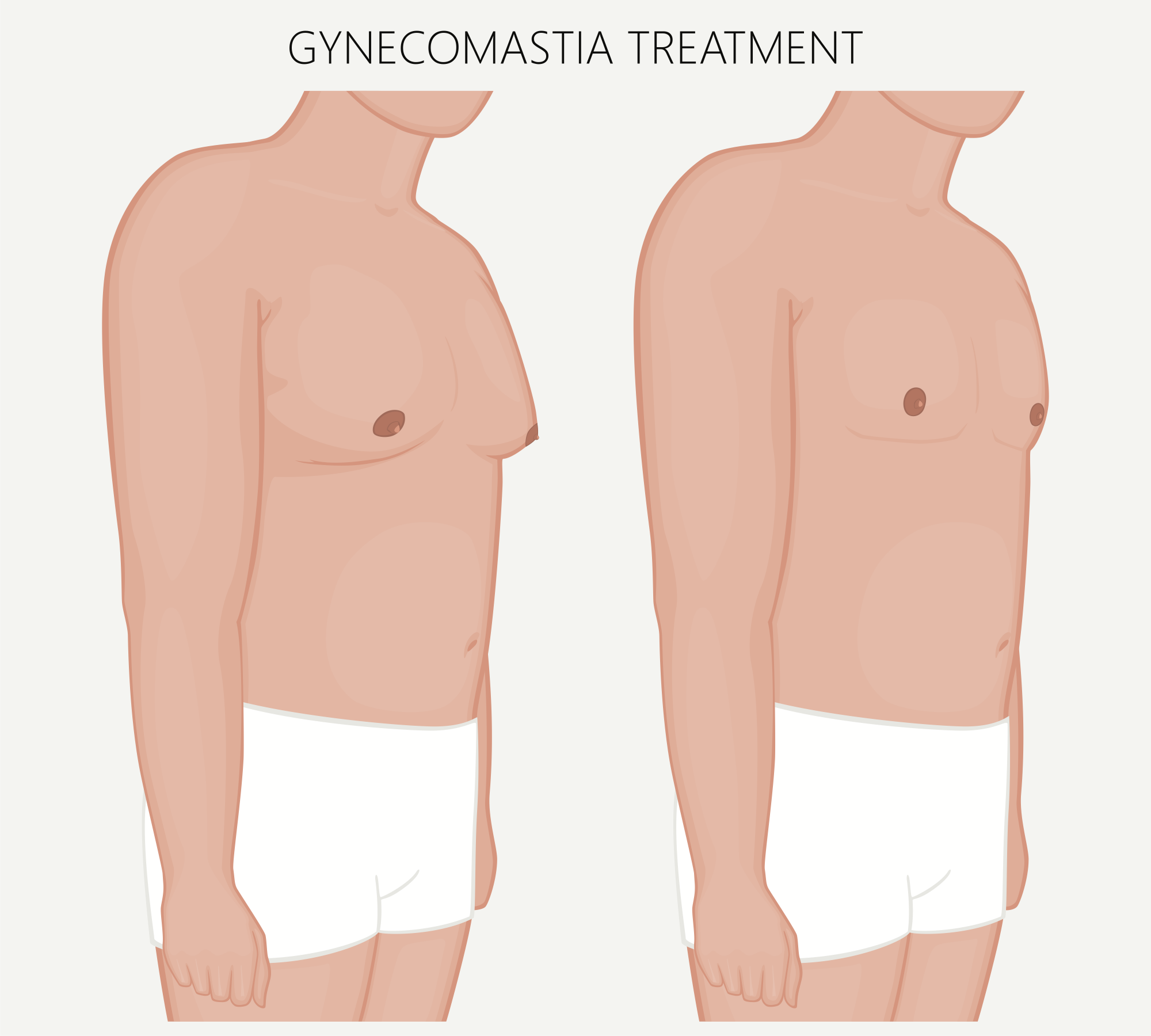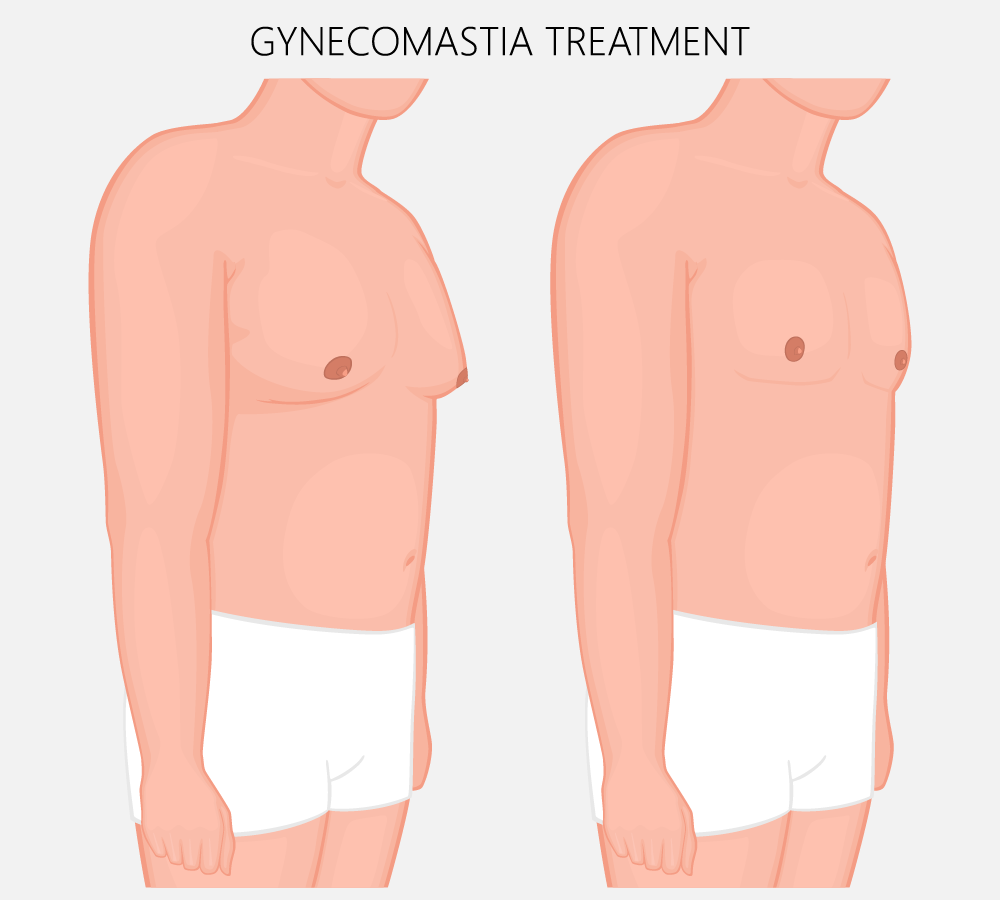
Gynecomastia: What Is It and How To Treat It
By Beverly Fischer on September 12, 2019
Gynecomastia Back to Blog
Back to Blog


While we are all human, most of us assume that men and women are fundamentally different when it comes to sex-specific traits. However, it’s important to understand that all humans have certain hormones, namely testosterone and estrogen, that we typically associate with one sex.In most cases, men produce more testosterone than women and women produce more estrogen than men, but our bodies are all unique, and it’s not unusual for circumstances to cause our hormone levels to fluctuate, potentially resulting in a variety of side effects. Gynecomastia is one such occurrence that is often related to a hormone imbalance in men.
What is Gynecomastia?
When men experience reduced levels of testosterone and/or increased levels of estrogen, one possible side effect is gynecomastia, a condition characterized by breast tissue growth or swollen breast tissue. In addition to swelling, symptoms may include pain, tenderness, and discharge from one or both nipples.
possible side effect is gynecomastia, a condition characterized by breast tissue growth or swollen breast tissue. In addition to swelling, symptoms may include pain, tenderness, and discharge from one or both nipples.
Gynecomastia is not uncommon in certain stages of life, including immediately following birth (due to the presence of the mother’s estrogen), during the hormone changes of puberty, and in men over the age of 50. In most cases, gynecomastia will resolve on its own, within a few weeks of birth, or within several months to a couple of years in adolescence or later life. It’s important to get diagnosed, as similar symptoms could also indicate issues like fatty breast tissue (false gynecomastia), breast cancer, or an abscess (infection) of breast tissue.
Potential Causes
There are a wide variety of potential causes for gynecomastia, from health conditions, to medications, to certain lifestyle choices. Medical conditions that may contribute to the onset of gynecomastia include:
– Hormone fluctuations associated with aging, especially if excess weight is a factor
– Hypogonadism
– Hyperthyroidism
– Kidney failure, liver failure, or cirrhosis of the liver
– Malnutrition
– Tumors
Several medications may also contribute to gynecomastia, including:
– Anti-androgens (often used in the treatment of prostate cancer)
– Anabolic steroids and androgens
– Anti-anxiety medications like diazepam
– Antibiotics
– Certain HIV/AIDS treatments, such as HAART or Efavirenz
– Certain chemotherapy drugs
– Gastric mobility medications like metoclopramide
– Heart medications like digoxin
– Tricyclic antidepressants
– Ulcer medications like cimetidine
– Herbal products containing estrogens
Lifestyle choices can also play a role, especially when it comes to the use or abuse of:
– Alcohol
– Amphetamines
– Marijuana
– Heroin
– Methadone
Avoiding alcohol and illegal drug use can help you to avoid the onset of gynecomastia and aid in treatment, as can reviewing needed medications to see if gynecomastia is a potential side effect.
Treatment Options
Diagnosis for gynecomastia typically requires a blood test and mammogram, although further testing, including CT and MRI scans, testicular ultrasound, and tissue biopsy, may be necessary. Following diagnosis, treatment options could include additional visits to track progress and see if the condition improves on its own, treating underlying conditions or contributing factors, or taking certain medications, such as those designed to inhibit estrogen production.
Surgical intervention is also an option, and treatments may include liposuction to remove breast fat or mastectomy to remove breast gland tissue. These surgeries are designed to flatten and contour the chest, creating a more typically masculine physique.
Related: Dislike Your Dad Bod?
Gynecomastia can cause physical, psychological, and emotional complications. If you’ve explored other options and you’re interested in cosmetic surgical intervention, contact the offices of Beverly Fischer, MD online or at 410-308-4700, to request a consultation and learn more.
Dr. Beverly A. Fischer is passionate about her role as a leading female plastic and cosmetic surgeon in Baltimore, Maryland and beyond. She believes that plastic surgery makes a positive, life-changing difference, whether you’re renewing your body, face, and skin or embarking on an entire gender transition.
Reach out
We are happy to answer any questions you have. Use the form to request a consultation or more information about specific services. A member of our team will will contact you shortly.
Contact Us

